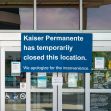A federal appeals court asked the California Supreme Court to make a definitive ruling on whether a business interruption insurance provider can refuse coverage for losses caused by COVID-19. Policyholders and lower courts alike are desperate for concrete and consistent rules concerning business loss coverage for pandemic-related claims.
The underlying case concerns Napa Valley restaurant French Laundry. French Laundry and its sister establishments were forced by government order to close during the pandemic. Naturally, forcing a restaurant to shutter its doors led to a loss of business income. French Laundry’s parent company filed a business loss claim which was rejected by the policy issuer, Hartford Fire Insurance Co.
The business loss question has arisen in dozens, if not hundreds, of cases around the country in light of the pandemic. Business interruption insurance is a subset of property insurance, meant to cover economic damage suffered while a property is closed for repairs or due to a nearby safety hazard. The policies usually kick in when a property is physically damaged by some event, such as a fire or flood, to cover the loss of revenue while the business is inoperable. They also cover instances in which the government mandates closure because of a hazard, such as a nearby building ready to topple.
Business owners around the country have sought to use their business interruption insurance to cover losses caused by government mandates during the coronavirus pandemic. Insurers have denied these claims on two principal grounds: (1) The possible or even actual presence of a virus does not constitute a “physical loss” within the normal meaning of a property insurance policy; and (2) most of these policies explicitly exclude “viruses” due to exclusions which were added after the SARS outbreak in 2003.
For the most part, courts have ruled in favor of the insurers. In November, for example, the Washington Supreme Court ruled against policyholders. The French Laundry case, however, adds a bit of a twist: The virus exclusion may not cover a “Fungus, Wet Rot, Dry Rot, Bacteria and Virus - Limited Coverage” provision included elsewhere in the policy. French Laundry argues that applying the greater virus exclusion to this “Limited Coverage” provision would render the limited coverage provision bit entirely illusory. Some state courts have ruled that such limited virus coverage provisions are enough to trigger coverage in similar COVID loss cases.
The Ninth Circuit Court of Appeals certified the question to the California Supreme Court - the second time in recent months it has done so. In December, the Ninth Circuit asked the Court to address whether the “actual or potential” presence of the novel coronavirus can constitute a “direct physical loss.” “Courts at both the state and federal level are grappling with the application of California insurance contract interpretation law to coverage for losses from business shutdowns due to government closure orders in response to COVID-19,” wrote the Ninth Circuit in its most recent certification order. The circuit court stressed the importance of resolving the issue: “While both state and federal courts have published opinions providing some guidance, there remains much uncertainty as to how California law applies in many scenarios (such as the scenario presented in this case).”






